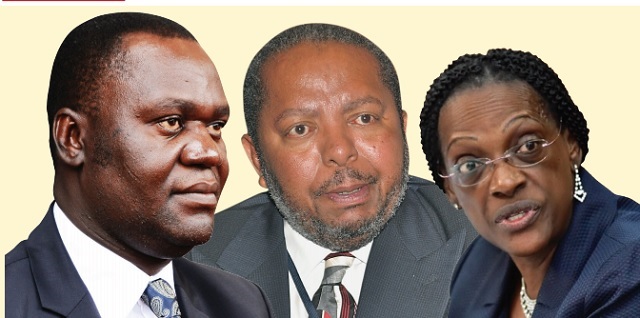
Dfcu then made a profit of Shs 127 billion in just a year of acquiring the bank. But in the latest case, COSASE has heard that BoU sold assets of Global Trust Bank in even more controversial circumstances. It emerged that Bagyenda disclosed the financial situation of GTB to DFCU before the bank was closed. Apparently, BoU entered a confidential purchase agreement to sell GTB to Dfcu two weeks before Global Trust bank was eventually closed on July 25, 2014.
It also emerged that BoU does not have the required documents for such transactions; including minutes of the negotiation of the sale, bidding documents or evaluation reports of the assets of GTB. Bagyenda told the committee that BoU did not follow any procurement process.
Apart from this, it also emerged that Bagyenda single-handedly signed and witnessed the agreement. Bagyenda first told the committee that she had consulted with the respective authorities before signing the agreement but both central Bank Governor Tumusiime Mutebile and BoU Board Secretary, Susan Kanyemibwa, denied having been aware of the decision.
“I doubt that that’s the case,” Mutebile told the committee, “I want to know from Board Affairs if this matter was discussed in the board meeting because that would be where that authority could have been obtained.” Kanyemibwa responded that from the minutes of the board for the period January 2014 to December 2014 before her, the matter of the agreement being referred to was never discussed.
BoU revoked GTB’s licence in July 2014 because of under-capitalisation and corporate governance weaknesses. The case of GTB is interesting because it almost cost Bagyenda her job. When BoU decided to close the bank, former Nigerian President General Yakubu Gowon, who had interests in the bank, visited Uganda. While here, he visited the President at State House Nakasero and told him that he had been capitalising the bank but the Central Bank had decided to close it.
President Museveni drove his car from State House and came to Yakubu’s Hotel suite at Serena Hotel. While there, he called Mutebile and Bagyenda to come to the Hotel. While at the meeting, President Museveni told the officials what the owner of the bank had told him.
Mutebile tried to explain but the president was so angry, he could not let him explain. Mutebile kept quiet. When Bagyenda also tried to explain, Museveni cut her off and called her the enemy of development. He said he was going to fire them for what they had done.
Unhappy with how they had been treated by the president, Mutebile and Bagyenda, decided to resign before the president could fire them. Insiders say that Bagyenda had already typed out and signed her resignation letter. However, before she could resign, the president was presented with new evidence from among others a Ugandan investor who was working closely with the GTB owner.
The Nigerian co-owned NiC, GTB and an insurance company in Rwanda. It turned out that he was in the habit of moving money around the three companies whenever the regulators of these sectors raised concerns. Officials at the Central Bank were armed with data showing that he had only been compliant six times out of eighteen. When this data was presented to the president, he was convinced.
The meeting took place at the State Lodge in Fort Portal. For a number of times, Bagyenda would go to the president’s seat, kneel and the president would say; “now you are my friend”. Insiders say this could have emboldened Bagyenda to act single-handedly in selling GTB. However, for critics, this does not explain how she could sell a bank without Mutebile or the board’s knowledge and approval.
Three years later, President Museveni found himself in almost a similar situation this time over Crane Bank. In a meeting attended by tycoon Sudhir Ruparelia and officials from Bank of Uganda (BoU), President Museveni listened attentively as the central bank accused Sudhir of fraud at Crane Bank.
 The Independent Uganda: You get the Truth we Pay the Price
The Independent Uganda: You get the Truth we Pay the Price





